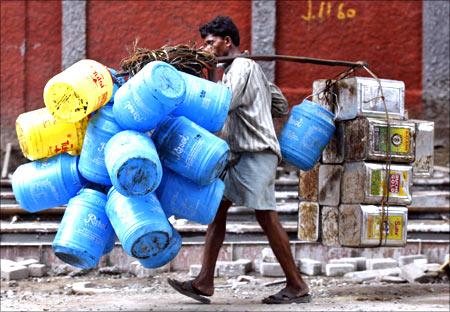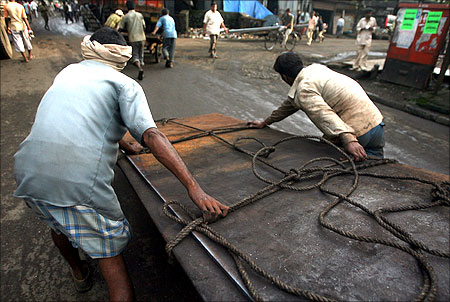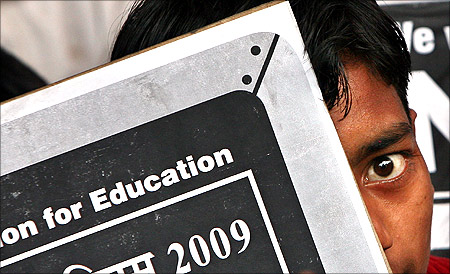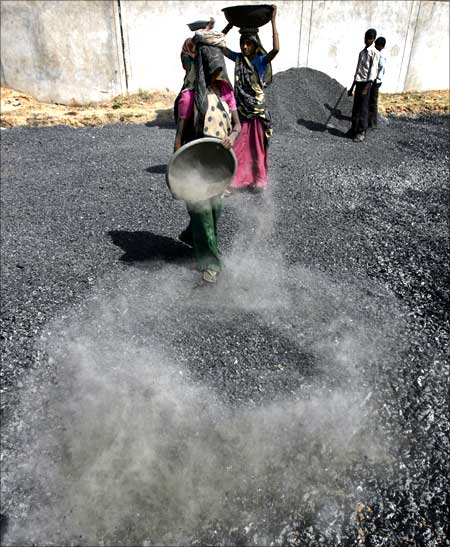 | « Back to article | Print this article |
BAD NEWS! India's GDP to fall further, says RBI
Indicating that it may not tweak interest rates in Tuesday's policy review, the Reserve Bank of India on Monday said it will try to strike a balance between the need for promoting growth and containing inflationary expectations.
The RBI said that GDP growth during the current fiscal is likely to fall below its earlier projection of 7.6 per cent, while inflation, which is still a cause for concern, may moderate to 7 per cent by March-end.
For Rediff Realtime News On RBI, Click Here!
Click NEXT to read further. . .BAD NEWS! India's GDP to fall further, says RBI
"Even as the growth slowdown emerges as the major challenge, inflation risks persist, posing a challenge for monetary policy in achieving low and stable inflation with minimal sacrifice of growth," said the Macro-Economic and Monetary Developments Review released by the RBI on the eve of the third quarter policy announcement.
Consequently, "Monetary actions will need to strike a balance between risks to growth and inflation," it said.
The RBI-sponsored survey by professional forecasters has revised the growth projection for the current fiscal downward to 7 per cent, which is lower than the central bank's projection of 7.6 per cent.
Click NEXT to read further. . .
BAD NEWS! India's GDP to fall further, says RBI
"Growth is likely to turn weaker than earlier anticipated," the RBI said.
The government also said growth could be around 7 per cent in 2011-12, down from 8.5 per cent a year ago.
Commenting on the recent improvement in the price situation, the RBI said, "While in the short run, moderating inflation will provide some space for monetary policy to address growth concerns, in the absence of structural measures to address a range of supply bottlenecks, this will be temporary respite."
Overall inflation, which has remained near double digits for 11 months, declined to 7.5 per cent in December, 2011.
Click NEXT to read further. . .
BAD NEWS! India's GDP to fall further, says RBI
Expressing concern over the deterioration in the fiscal position of the government, the RBI suggested that the government should move ahead with reforms, especially in direct and indirect taxes.
"The central government's deficit indicators are under duress due to higher subsidies and lower tax collections.
"Fiscal reforms, including the Direct Taxes Code and Goods and Services Tax, are, therefore, needed to contain deficits in 2012-13," the RBI said.
It also called for budgetary solutions to contain the growing subsidy commitment in order to enhance the potential growth rate of the economy.
Click NEXT to read further. . .
BAD NEWS! India's GDP to fall further, says RBI
Last month, Finance Minister Pranab Mukherjee had said the subsidy burden in FY'12 could exceed Budget estimates by Rs 1 lakh crore (Rs 1 trillion).
This is likely to put pressure on the fiscal deficit, which is projected at around 4.6 per cent of the GDP.
It said that a widening current account deficit and a mounting revenue deficit is putting the fiscal position under strain and impacting the government's wherewithal for capital spending.
The report admitted that the liquidity deficit is higher than what suits the RBI, but did not say anything specific on measures to be adopted, like a cut in the cash reserve ratio, as banks have been asking.
Banks have borrowed nearly Rs 1.5 lakh crore (Rs 1 trillion) from the overnight borrowing window in the past few weeks, leading to demands for a cut in the CRR, or the amount of deposits banks park with the RBI.




